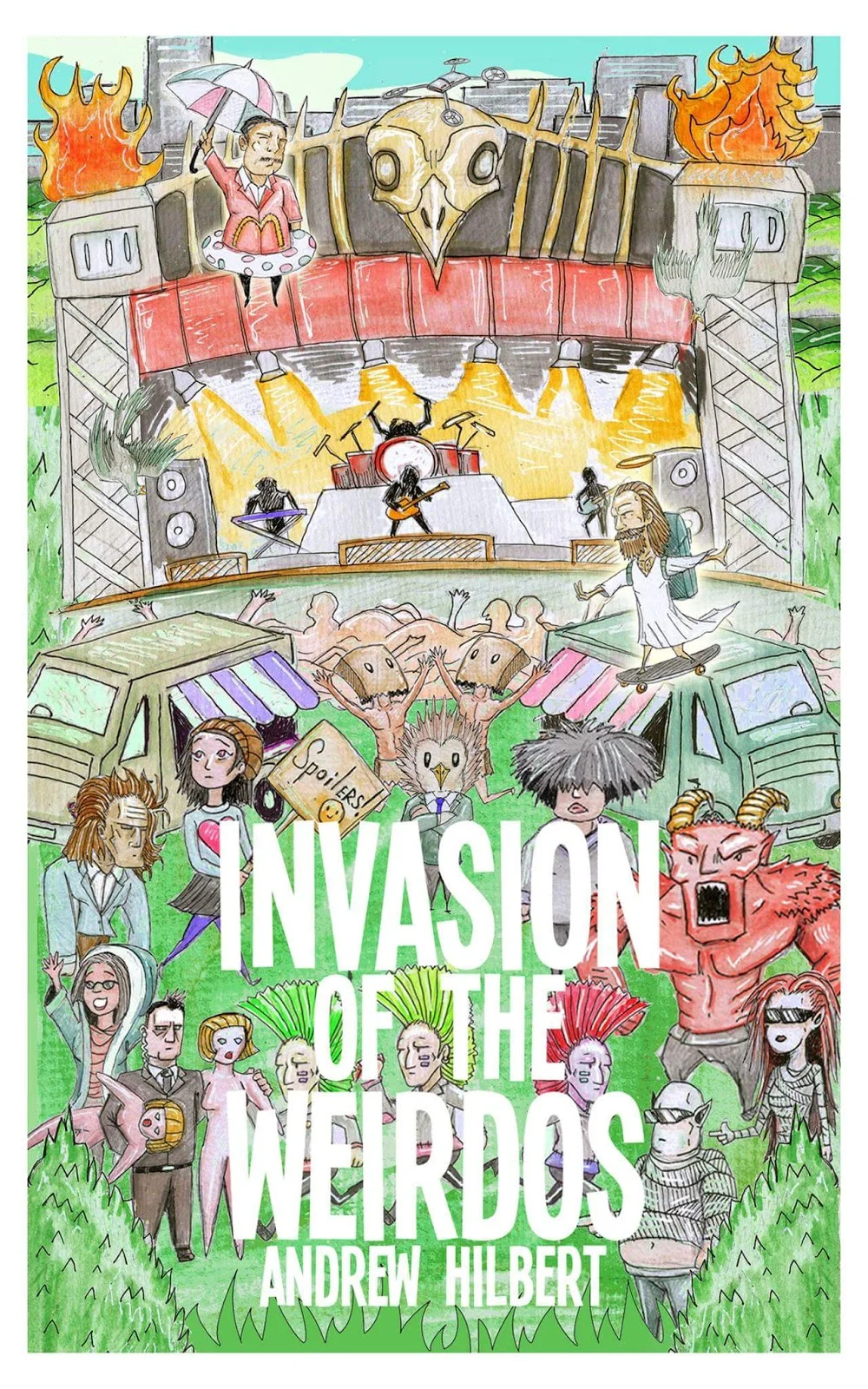Book Review : Andrew Hilbert - Invasion of the Weirdos (2017)
Order INVASION OF THE WEIRDOS here
Austin-based author Andrew Hilbert is one of these "best kept secret" guys who is WAY too fucking cool and out there for his own good. His novella Death Thing burned a hole through my skull in 2015 and while I haven't reviewed it ON THE SITE, his follow-up release Bangface and the Gloryhole could've probably gotten him arrested in certain countries. Hilbert doesn't give a fuck and that is why I love reading him. He resurfaced like a marmot this spring to release a novel about people who give too much of a fuck called Invasion of the Weirdos through purveyors of boundless genre literature Perpetual Motion Machine Publishing. And it is by far Hilbert's most ambitious, smart and observant book to date. Perhaps not his most biting overall, but it's most unconventional and Hilbertesque for sure. He's back!
Invasion of the Weirdos is a novel about the indie art scene in Austin revolving around an anarchist collective named the Group that Doesn't Exist. There are many storytlines riding coattails to one another, but it all ties-in to it: Ephraim is cast out early and turns to McDonald's for solace, John Scott Michael is a mysterious newcomer to the Group that claims to be disgraced government assassins and there's a podcasting preacher looking to save the lost souls of Austin from themselves (or something like that). In other words: it's just another day in Austin, Texas, a city that prides itself in being weird, creative and that may be a little self-involved after all. Quite frankly, I don't think anybody but Andrew Hilbert could've come up with such an otherworldly tale of people having their heads up their asses.
The first thing I've thought about when reading Invasion of the Weirdos was another iconic Austien story: Richard Linklater's Slacker. Unlike Linklater's movie, Hilbert's novel is openly mocking the city's aggressive countercultural leanings instead of celebrating them, but there are similarities in how it is portrayed. For both Hilbert and Linklater, Austin is a frantic, buzzing city full of young people that running into one another. It's a canvas where ideas collide. I thought Invasion of the Weirdos was somewhat of a bleak sequel to Slacker portraying a city that sold its soul over the course of twenty-five years and became a corporate spinoff of what it used to be. The novel is meant to be funny and irreverent and I'm sure Andrew Hilbert never even watched Slacker, but it terrifyingly echoes Richard Linklater's iconic film nonetheless.
Everyone in Invasion of the Weirdos is obsessed with meaning. The Group that Doesn't Exist claims we live in meaningless times, yet claim to be its sole purveyors. Ephraim's quest for meaning is much more personal than his ex-collective's and undercuts the arbitrary line between good and evil they've traced by willingly going to McDonald's and seeing it for what it is: a food serving factory where everyone is mildly miserable, customers included. John Michael Scott is the only character with anchored meaning in his life yet nobody takes him seriously because it would invalidate their own perception that they have found the truth. Invasion of the Weirdos shrewdly draws a parallel between art and religion that is, once again, as frightening as it is hilarious.
I've enjoyed Invasion of the Weirdos perhaps as much as I did Andrew Hilbert's previous works, although it's quite different. Sure, there is the undeniable Richard Linklater influence, but there is a Kevin Smith, View Askew-like banter dynamic to it, too. It's fast-moving and dialog-heavy. Perhaps the best "new" thing in Invasion of the Weirdos is the scathing indictment of a stalling, self-obsessed cultural scene that became a new object of worship. Some of you might wonder who Andrew Hilbert thinks he is to pass judgement on the city he lives in and the question makes sense in a vacuum. He's the guy that doesn't wait for your permission to do anything. He never waited for a publisher to release books, always wrote about what he really wanted to write and never measured success in major deals. Andrew Hilbert's creative integrity makes him more qualify than you or me to pass judgement on whatever the fuck he wants.





